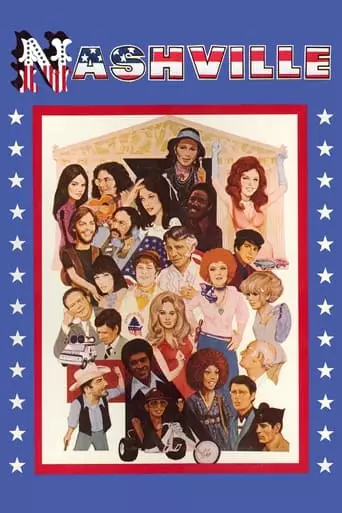
Nashville (1975) Watch Online Free
The intersecting stories of twenty-four characters—from country star to wannabe to reporter to waitress—connect to the music business in Nashville, Tennessee.
Nashville (1975), directed by Robert Altman, is a sprawling, multi-character drama set in the country music scene of Nashville, Tennessee. The film takes place over five days leading up to a political rally for a populist outsider, Hal Philip Walker, who is running for president. The movie blends the worlds of music, politics, and personal drama, capturing the disillusionment, ambition, and personal struggles of a group of musicians, political campaigners, and everyday people living in the city.
The plot centers around a large ensemble cast of characters, many of whom are connected to the country music industry. These characters include Barbara Jean (Ronee Blakley), a troubled country music star, Haven Hamilton (Henry Gibson), a veteran country singer with political ambitions, and Connie White (Karen Black), another ambitious country singer. The narrative unfolds with these characters navigating personal relationships, performing in clubs, and attending Walker’s campaign rally, where tensions rise, culminating in a shocking act of violence.
Altman’s narrative technique is notable for its use of overlapping dialogue and multiple storylines that intersect in unexpected ways. The film’s characters are not confined to one singular plotline but are connected by the culture of Nashville and the influence of country music. This structure allows for an intricate portrayal of American life in the 1970s, blending political satire, cultural commentary, and personal drama. Through this style, Altman critiques the commodification of music, the superficiality of celebrity culture, and the illusion of the American Dream.
The film’s characters are richly developed, with each one serving as a reflection of societal issues at the time, from the political landscape to the gender dynamics in the music industry. Barbara Jean’s mental breakdown is an example of how fame can distort personal identity and mental health, while Sueleen’s struggle to become a singer, despite her lack of talent, highlights the desperation and exploitation often present in the pursuit of fame.
1. Fame and Exploitation: Several characters, such as Sueleen, are willing to sacrifice their dignity to achieve success in the entertainment industry, illustrating the often painful and exploitative nature of fame.
2. Politics and the Public Image: Through the character of Hal Philip Walker, the film explores how politicians use public events to craft an image, regardless of the truth. Walker’s campaign serves as a critique of political populism.
3. Personal Identity and the American Dream: The movie examines the illusion of the American Dream through its characters’ varied ambitions and personal disillusionments, with many striving for success and recognition, only to be met with failure or emptiness.
4. Disconnection and Alienation: Many of the characters struggle with their personal lives, often feeling disconnected from those around them. The overlapping dialogue in Altman’s direction enhances this sense of isolation, making it feel as though these characters are living in a world that doesn’t care about their individual stories.
Watching Nashville will leave you with a sense of ambivalence—its complex characters and narratives may evoke a mix of emotions, from frustration to sympathy. The film’s tragicomic portrayal of the pursuit of fame, personal failure, and the illusion of the American Dream offers a profound meditation on modern life. While you may be entertained by the catchy country tunes and the zany, larger-than-life characters, the film’s underlying melancholy and sharp critique of society may linger, leaving you reflecting on the cost of fame and the fragility of personal identity. Nashville is a movie that stays with you long after the credits roll, challenging your understanding of the American experience and the human condition itself
